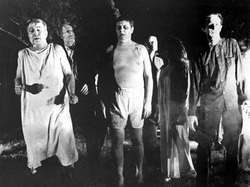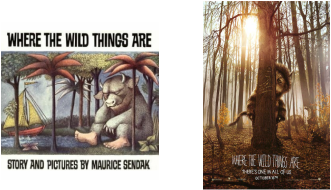|
No, it's not a new contagious disease looming on our health horizon. It's a problem that has been around for awhile -- at least since the invention of the motion picture camera. It's why librarians coined the phrase "don't judge a book by its movie." It's the Good Book/Bad Movie Syndrome!!! You know what I am talking about... when a scintillating, crystalline passage from a well-loved novel turns up as clean and clear as pond scum on the big screen... when fresh, flavorful characters that jump out from the written page slog along through dull scenes like the zombies from "The Night of the Living Dead" (although I'm quite sure that the screenwriter did not purposefully intend that effect.) Oh, where to start???? Children's and young adult books? Adult-oriented novels? The problem, of course, is narrowing the selection to a manageable number. So many stinkers... so little time to blog....  Zombies flee from bad movie adaptations And it's impossible, for me anyway, to compile a top 10 list (or would that be "worst 10 list"?), because they each have their own merits, or, in this case, demerits. Let us, for now, consider only children's literature. Oh, let us sing a lament for all the lyrical novels and picture books which have been reduced to trash by Hollywood. My personal hero, Dr. Seuss, has been a victim of vile, heinous crimes with the film adaptations of The Cat in the Hat and How the Grinch Stole Christmas. In a word, execrable. In two words, loud and obnoxious. In three, unwatchable, joyless, and -- did I mention -- unwatchable. Jim Carrey, you are no Boris Karlov (who narrated the original, cartoon adaptation, which is entirely watchable). Mike Myers, if you want to wear a costume with strange teeth, stick to Austin Powers. As for all that fur, you looked better head-banging to "Bohemian Rhapsody" in the mullet wig as Wayne Campbell. Other wonderful children' books that have been slaughtered include The City of Ember by Jean DuPrau (magical book, muddy movie) Diary of a Wimpy Kid by Jeff Kinney (maybe stick figures should remain stick figures), Alice in Wonderland (ruined at least four times!) and The Lightning Thief by Rick Riordan (overwhelmed by special effects and the unnecessary advancement of the characters from middle school to high school age). Then there is the strange case of Maurice Sendak's classic, Where the Wild Things Are, one of my all-time favorite picture books. It so beautifully captures the experience of being a child -- in barely 15 words per page. It's a wisp of a story: a rambunctious boy is sent to his bedroom without supper for misbehavior, where he conjures up a great adventure among fantastic beasts in an imaginary, far-off land, only to grow tired of their antics and lonely. He returns home to find his supper waiting for him and -- in the ultimate sign of forgiveness -- it's still hot. Yet, this picture book of 32 pages and less than 350 words was extrapolated into a 104 minute movie. An interesting movie, perhaps. A movie that provoked questions and evoked a certain air of melancholy. However, it was a movie that retained just bare shreds of the spirit and joy of the source material and that failed to entertain both children and adults. One of those movies out in the "no man's land."  Are we having fun yet? I don't think so. This Hollywood fiasco was definitely a case of Spike Jonze and Dave Eggars thinking way too much! There's plenty more where that came from. What's your favorite, delicious children's book that's been put through the Hollywood meat grinder and come out as indigestible gunk? What is it about the film process that so often can't deliver a movie that measures up to its source? Are some books simply unfilmable? In the case of Where the Wild Things Are, I would argue that is the dilemma. But there are also many books that would, in the right hands and with the appropriate sensitivity and fresh vision, translate well to the new medium. One only needs to view the Harry Potter adaptations to see that ethic at work and play. In fact, this is a rare instance in which I actually prefer the films. They cut to the essence of the story and eliminate all those tedious "Harry, Ron and Hermione" phrases, which seem to add about 50 to 75 pages to each book. I sometimes wonder if J.K. Rowling ever learned about the pronoun "they." And where was her editor?? But that's another blog.... Tomorrow, we'll tackle GBBM Syndrome - the adult strain...
0 Comments
Leave a Reply. |
AuthorTo find out more about me, click on the Not Your Average Jo tab. Archives
February 2024
Categories
All
|

 RSS Feed
RSS Feed